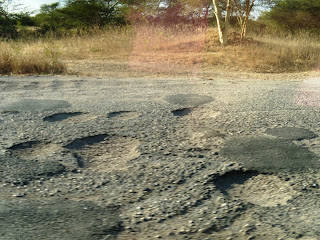My
recent travel to Eastern Europe brought something to my attention that I had
never thought much about before: ethnicity.
I have
lived nearly my whole life in societies that are clearly “melting pots” or at
least “salad bowls”. This means that the population has a variety of ancestral
origins that have all melded into a new national identity. Our families may
reflect a mixture of Irish, German, Norwegian, Hispanic… But, we are all
American. The same was the case in France. Genealogy may become our hobby, but
it is not really our exclusive defining identity.
Both
American and Western European societies reflect this mixing. We do talk about
race – “red and yellow, black and white” – but the race category is one that
tends to paint with a very wide brush stroke, overlooking other types of
differences within that large scope. We are seeing the inadequacy of such a
generalized description as the melting pot yields combinations that defy neat
racial distinctions. When considering this mix, we’re maybe not sure just where
Jews fit. Are they an ethnic group or is their identity one of culture, race, or
religion? But they stand out as a rather unique case.
Through
my contacts with Africa I was aware of the extremely strong ethnic differences
and ties that exist in cultures on that continent. It is sometimes described as
tribalism. The world was made sharply aware of the power of these identities by
the Hutu – Tutsi genocide in Rwanda in 1994. That tragedy seemed to confirm the
old adage that “blood is thicker than water”, even baptismal water, since this ethnic
genocide was Christian on Christian. During that conflict Kingdom values seemed
unable to stand up to these more powerful identities.
Coming
from this background I was really taken by surprise by the intensity of ethnic
identity in Eastern Europe. The depth of this identity was demonstrated during
the war following the breakup of the former Yugoslavia. As we were driving the
20 minutes from Osijek to Tordinci, we went through two other villages. As we
drove through our host described each of them ethnically: this is a Serbian village, this is a
Hungarian village, Tordinci is a Croatian village.
Through
the movement of empires over time, various groups were moved around Europe,
being settled in areas which were not native to them. They appear to have
maintained their original identities to an overwhelming degree. Even today
classes in elementary schools in these different villages in the country of
Croatia are taught in these different languages – Serbian, Hungarian, and
Croatian! These are villages that are only 2 or 3 miles apart. Instead of
integrating a unique national identity, the original ethnic identity is
cultivated. During the war, such clear ethnic separation made it very easy for
the Serbian army to target certain villages and bypass others. For the villages
we saw, the Serbian and Hungarian ones were untouched and the Croatian one was
completely destroyed.
The
importance and liberating newness of “Kingdom identity” suddenly became
strikingly clear to me. Embracing our
identity as Sons of God as our primary identity, replacing our ethnic or
national identity in ultimate importance, thus becomes deeply essential. The
Apostle Paul knew how counter-intuitive this is to our human nature that finds
comfort in familiar categories when he said “You are all sons of God through faith in Christ Jesus. For all of you
who were baptized into Christ have clothed yourselves with Christ. There is
neither Jew nor Greek, slave nor free, male nor female, for you are all one in
Christ Jesus.” (Galatians 3:26-28) In Ephesians he even mentions the
“barrier, the dividing wall of hostility” that existed between Jews and
non-Jews before Christ. But Christ “himself
is our peace, who has made the two one and has destroyed the barrier, the
dividing wall of hostility..” (Eph. 2:14).
Building
walls of separation is a human reaction to differences that is still being done
in our day, but there are no walls in the Kingdom of God! “Consequently, you are no longer foreigners and aliens, but fellow
citizens with God’s people and members of God’s household, built on the
foundation of the apostles and prophets, with Christ Jesus himself as the chief
cornerstone. In him the whole building is joined together and rises to become a
holy temple of the Lord.” (Eph. 2:19-21)
What a
powerful reality! How exciting to see how our Croatian colleagues are living
this out in their Croatian-Serbian ministry, looking beyond the very recent
ethnic wars and walls of separation. They are doing their part to prepare that
“great multitude that no one could count,
from every nation, tribe, people and langue, standing before the throne and in
front of the Lamb” (Revelation 7:9), with no walls of separation due to
ethnic background. We appreciate how they are demonstrating the importance of
living out Kingdom values, here and now.




